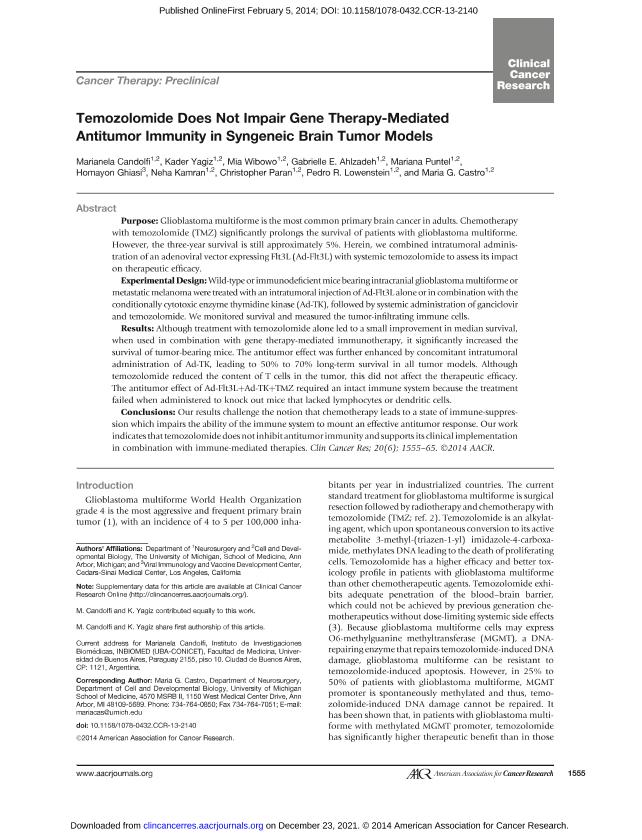Artículo
Temozolomide Does Not Impair Gene Therapy-Mediated Antitumor Immunity In Syngeneic Brain Tumor Models
Candolfi, Marianela ; Yagiz, Kader; Wibowo, Mia; Ahlzadeh, Gabrielle E; Puntel, Mariana; Ghiasi, Homayon; Kamran, Neha; Paran, Christopher; Lowenstein, Pedro R; Castro, Maria G
; Yagiz, Kader; Wibowo, Mia; Ahlzadeh, Gabrielle E; Puntel, Mariana; Ghiasi, Homayon; Kamran, Neha; Paran, Christopher; Lowenstein, Pedro R; Castro, Maria G
 ; Yagiz, Kader; Wibowo, Mia; Ahlzadeh, Gabrielle E; Puntel, Mariana; Ghiasi, Homayon; Kamran, Neha; Paran, Christopher; Lowenstein, Pedro R; Castro, Maria G
; Yagiz, Kader; Wibowo, Mia; Ahlzadeh, Gabrielle E; Puntel, Mariana; Ghiasi, Homayon; Kamran, Neha; Paran, Christopher; Lowenstein, Pedro R; Castro, Maria G
Fecha de publicación:
2014
Editorial:
American Association For Cancer Research
Revista:
Clinical Cancer Research
ISSN:
1078-0432
Idioma:
Inglés
Tipo de recurso:
Artículo publicado
Clasificación temática:
Resumen
PURPOSE: Glioblastoma multiforme is the most common primary brain cancer in adults. Chemotherapy with temozolomide (TMZ) significantly prolongs the survival of patients with glioblastoma multiforme. However, the three-year survival is still approximately 5%. Herein, we combined intratumoral administration of an adenoviral vector expressing Flt3L (Ad-Flt3L) with systemic temozolomide to assess its impact on therapeutic efficacy. EXPERIMENTAL DESIGN: Wild-type or immunodeficient mice bearing intracranial glioblastoma multiforme or metastatic melanoma were treated with an intratumoral injection of Ad-Flt3L alone or in combination with the conditionally cytotoxic enzyme thymidine kinase (Ad-TK), followed by systemic administration of ganciclovir and temozolomide. We monitored survival and measured the tumor-infiltrating immune cells. RESULTS: Although treatment with temozolomide alone led to a small improvement in median survival, when used in combination with gene therapy-mediated immunotherapy, it significantly increased the survival of tumor-bearing mice. The antitumor effect was further enhanced by concomitant intratumoral administration of Ad-TK, leading to 50% to 70% long-term survival in all tumor models. Although temozolomide reduced the content of T cells in the tumor, this did not affect the therapeutic efficacy. The antitumor effect of Ad-Flt3L+Ad-TK+TMZ required an intact immune system because the treatment failed when administered to knock out mice that lacked lymphocytes or dendritic cells. CONCLUSIONS: Our results challenge the notion that chemotherapy leads to a state of immune-suppression which impairs the ability of the immune system to mount an effective antitumor response. Our work indicates that temozolomide does not inhibit antitumor immunity and supports its clinical implementation in combination with immune-mediated therapies.
Palabras clave:
Temozolomide
,
Gene Therapy
,
Adtk
,
Adflt3l
Archivos asociados
Licencia
Identificadores
Colecciones
Articulos(IIBBA)
Articulos de INST.DE INVEST.BIOQUIMICAS DE BS.AS(I)
Articulos de INST.DE INVEST.BIOQUIMICAS DE BS.AS(I)
Citación
Candolfi, Marianela; Yagiz, Kader; Wibowo, Mia; Ahlzadeh, Gabrielle E; Puntel, Mariana; et al.; Temozolomide Does Not Impair Gene Therapy-Mediated Antitumor Immunity In Syngeneic Brain Tumor Models; American Association For Cancer Research; Clinical Cancer Research; 20; 6; 2014; 1555-1565
Compartir
Altmétricas



